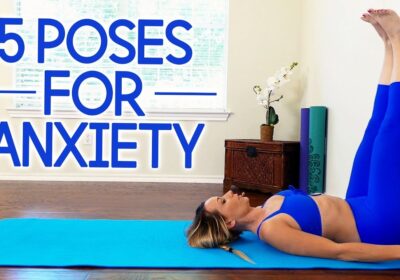Yoga for Depression

Summary:
- Unlike other severe mental disorders, yoga can be used as a monotherapy for patients with mild to moderate depression.
- Yoga practices useful for patients with depression are supposed to be essentially stimulating in nature, though the need of soothing or calming down yoga practices cannot be undermined especially in cases where agitation, irritability and anger are associated with depression.
Depression is a common mental health condition that affects millions of people worldwide. It is characterized by feelings of sadness, hopelessness, and a lack of interest in activities that were once enjoyed. While traditional treatments such as medication and therapy are effective, many people are also turning to alternative methods like yoga to help manage their symptoms.
Yoga is an ancient practice that combines physical postures, breathing techniques, and meditation to promote overall well-being. Yoga has been shown to be effective as a monotherapy (single treatment) for individuals with mild to moderate depression. Research studies have found that regular yoga practice can reduce symptoms of depression, improve mood, and enhance overall well-being. It is important to note that while yoga may be effective as a monotherapy for mild to moderate depression, individuals with severe depression may need additional treatment such as medication or therapy. It is always best to consult with a healthcare professional before starting any new treatment for depression.
In this guide, we will explore the benefits of yoga for depression and also discuss the different types of yoga that may be most beneficial for depression.
Here is a list of yoga practices which are useful for patients with depression.
- Pranayama (breathing exercises): Specific breathing techniques like kapalbhati and bhastrika can help to reduce feelings of depression.
- Dynamic practices: Dynamic practices like surya namaskara (sun salutation) are overall considered good for patients with depression especially in view of their stimulating nature.
- Asana (yoga poses): Certain yoga poses such as chest openers (ardha-chakrasana, bhujangasana, dhanurasana) are specifically considered good for building self-esteem and can ward off depression.
- Yoga Nidra (yogic sleep): Though yoga nidra is a soothing practice, it can be good for rejuvenation at the end of stimulating sessions for patients with depression. This practice involves deep relaxation and visualization techniques to help reduce stress.
- Meditation: Regular meditation practice can help to quiet the mind and reduce feelings of stress and anxiety, which can be beneficial for patients with depression. But meditation may not be feasible in certain patients who have a tendency to ruminate. Appropriate professional guidance before initiating meditation will be mandatory.
- Kriyas: Yogic cleansing techniques (kriyas) can be of particular use for patients with depression. These provide lightness to the body and are helpful in the bodily symptoms associated with depression. Some specific examples are laghu shankha prakshalana, vamana dhauti, agnisar kriya.
There is a possibility of adverse effects with yoga practices among patients with depression. These adverse effects can be either due to the wrong selection of yoga practice or inappropriate way of yoga practice. Here is a list of yoga practices which can be risky for patients with depression.
- Advanced practices: Inversions such as headstands and handstands; extreme backbends like chakarasana can put a patient to risk and are not mandatory for gaining therapeutic benefits of yoga.
- Intense or vigorous yoga practices: Intense exercise sessions have been found to be counterproductive for patients with psychiatry issues. Extrapolating the same information for yoga, we need to ensure that the intensity of yoga practices is mild to moderate to obtain optimal benefits. Hence practices like power yoga, advanced ashtanga series and hot yoga are not considered good for patients with depression.
- Forced stretching: Forcing the body into stretches can cause discomfort and can be triggering for those with depression.
- Breath control techniques or Kumbhaka: Certain breath control techniques such as retention can be overwhelming and may increase feelings of anxiety in individuals with depression and are generally not used for therapeutic purposes.
- Long holds in poses: Holding poses for extended periods of time can cause feelings of discomfort and can be triggering for those with depression.
Possible adverse-effects of yoga practices among patients with depression are:
- Increased feelings of anxiety or panic: Some yoga poses, such as inversions or twists, may trigger feelings of anxiety or panic in individuals with depression.
- Increased feelings of isolation: Yoga practices that involve prolonged periods of silence or meditation may cause individuals with depression to feel isolated or disconnected from others.
- Physical injury: Individuals with depression may be more prone to injury due to a lack of focus or attention to proper alignment during yoga practice.
- Exacerbation of negative body image: Yoga practices that focus on physical appearance or involve a lot of mirror work may exacerbate negative body image in individuals with depression.
- Lack of motivation: Individuals with depression may lack the motivation to attend yoga classes or practice at home, leading to a lack of progress in their physical and mental well-being.
- Increased feelings of fatigue: Yoga practices that involve prolonged periods of physical activity may cause increased feelings of fatigue in individuals with depression.
Mechanism of action of yoga
Yoga is believed to have a positive impact on depression through several mechanisms of action. One of the main mechanisms is through the release of neurotransmitters, specifically serotonin and dopamine, which are known to regulate mood and emotion. Yoga practices such as deep breathing, meditation, and physical postures have been shown to increase the release of these neurotransmitters, leading to an improvement in mood and a reduction in symptoms of depression.
Another mechanism of action is through the regulation of the stress response. Yoga practices such as yoga nidra and pranayama have been shown to activate the parasympathetic nervous system, which helps to reduce the activity of the sympathetic nervous system, leading to a reduction in stress and anxiety. This is thought to be achieved through the activation of the hypothalamus-pituitary-adrenal (HPA) axis, which plays a key role in regulating the stress response.
Lastly, yoga may have an impact on depression through its ability to improve sleep. Yoga practices such as yoga nidra have been shown to improve sleep quality and reduce insomnia, which can help to alleviate symptoms of depression.
There are certain barriers to the adoption of yoga as a form of therapy for patients with depression.
- Limited access to qualified instructors: Not all areas have access to trained and qualified yoga instructors, making it difficult for patients with depression to find appropriate classes.
- Difficulty in engaging in physical activity: Some patients with depression may have difficulty with motivation and physical activity, making it challenging for them to engage in yoga practice.
- Difficulty with concentration: Depression can affect cognitive function, making it difficult for patients to focus and engage fully in the yoga practice.
- Difficulty with flexibility: Some patients with depression may have physical limitations that make it challenging to perform certain yoga poses.
- Fear of judgement: Some patients with depression may feel self-conscious or anxious about practicing yoga in a group setting, fearing judgement from others.
- Lack of evidence-based research: While there is some evidence to suggest that yoga can be beneficial for patients with depression, there is a lack of well-designed, randomized controlled trials to support its use as a sole treatment option.
- Limited accessibility: Yoga may not be accessible to everyone due to cost, mobility or other limitations.
- Not suitable for severe cases: Yoga may not be suitable for patients with severe depression, as it may not be intense enough to provide the necessary support.
It’s always important to consult with a healthcare professional before starting any new exercise or yoga regimen, especially if you have a history of depression or other mental health conditions.
Related Posts

Yoga for Anxiety Disorders
Summary: Yoga can be used as both an add-on treatment and as a monotherapy for…

Yoga for Back pain
Summary: Yoga can be used as both an add-on treatment and as a monotherapy for…

Yoga for Headache
Summary: Yoga can be used as both an add-on treatment and as a monotherapy for…

Leave a Reply